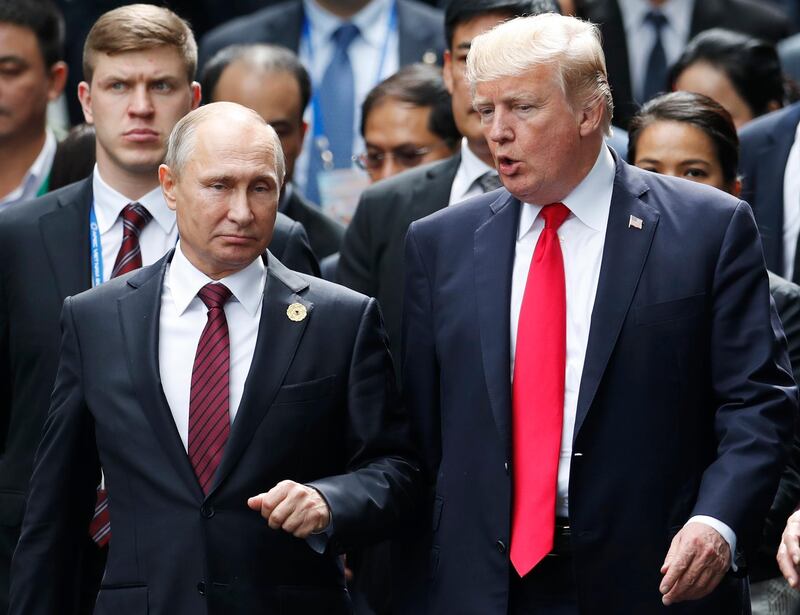In the lead up to the US-Russia summit in Helsinki on Monday, there is much speculation in Washington, as well as in many Middle Eastern and European capitals, about the prospects of presidents Donald Trump and Vladimir Putin striking a grand bargain that involves a trade-off over Syria and Ukraine. The alleged quid pro quo would have Russia exercise its influence in Syria to rollback Iran's military footprint in return for the White House scaling back the sanctions placed on Russia for its seizure of Crimea and its destabilisation of eastern Ukraine.
The speculation is partly being fueled by the recent refusal of US National Security Advisor John Bolton, who met President Putin recently, to rule out the possibility of dropping current sanctions. Furthermore, President Trump himself left the door to recognising Russia’s annexation of Crimea open, telling reporters that “we’re going to have to see,” that Russia has “spent a lot of money rebuilding it,” and that he and Mr Putin will indeed be talking about Ukraine and Syria.
The purported deal reportedly has the support of America’s closest Middle Eastern allies. Israeli Prime Minister Benjamin Netanyahu visited Moscow three times this year, including this week, to secure Russian guarantees against further Iranian entrenchment in Syria. He, and some of America’s Arab Gulf allies, are said to have independently promised their Russian counterparts to use their good offices with Washington to push for a US-Russian rapprochement along similar lines.
Yet, despite all the above, a more sober examination of the political and military constraints indicates that such a bargain, if at all on the table, is unlikely to succeed. For one, any understanding premised on a trade-off between Ukraine and Syria will run into stiff resistance in the US Congress and will be almost impossible for President Trump to deliver on. US sanctions against Russia for its activities in Ukraine and Crimea were originally enacted as executive orders by former President Barack Obama following Russia's 2014 annexation of Crimea, but were swiftly legislated into law by Congress and are nearly impossible for the president to reverse.
Fears that President Trump would try to overturn or delay sanctions led to additional legislation making the implementation of the Russia sanctions compulsory. While the law does allow the president to issue some individual waivers on national security grounds, these would still have to be reviewed by the relevant congressional committees.
President Trump would also have to contend with the anticipated uproar from European allies, let alone stiff domestic opposition, who consider any American legitimisation of Russia’s military actions in Ukraine as undermining Europe’s security framework and the post-World War II order on which it relies.
The Europeans may have little pull with the Trump administration, but at a time when the president has locked horns with them over trade, financial and military contributions to NATO, and a host of multilateral treaties, such a brazen move could push cross-Atlantic relations into the realm of the unknown, triggering alarm bells even within his own administration.
A much more politically plausible, and perhaps more prudent, understanding that could emerge from Helsinki is one that is limited to US-Russian trade-offs in Syria where, contrary to conventional wisdom, Washington continues to have some significant cards to play. Although Syrian regime forces, backed by the Russian air force and Iranian proxies, are scoring significant victories in various parts of the country, the United States and its local allies still hold territory east of the Euphrates river equivalent to about twenty per cent of the country. These include the majority of Syria's oil fields, large swaths of rich farmland considered to be the country's breadbasket, and the strategically important Euphrates dam.
President Putin appears eager to cap what has so far been a remarkably successful military intervention in Syria by securing a political settlement that legitimises and reflects his achievements, but he has yet to succeed in doing so. He has repeatedly announced Russia’s version of “mission accomplished” and troop drawdowns from Syria only to have conditions on the ground, and the ambitions of his local partners, entangle him in yet another military campaign. Without the United States and the Syrian assets currently under its control he will be hard-pressed to insure the political and financial sustainability of any allied regime in Damascus.
The challenge for what may otherwise be a short-term confluence of US-Russian interests over Syria lies in the powerful realities on the ground, which will make such a deal difficult to implement. Just as many underestimate the current US leverage in Syria, they also tend to exaggerate Russian power, particularly when it comes to delivering on its end of the bargain, of reigning in Iran. President Putin can order his air force to stand down as Israeli jets regularly pound Iranian positions in Syria, but he has neither the troops nor the inclination to take on tens of thousands of Iranian-backed proxies fighting alongside regime forces.
How, if at all, Russia can compel Iran to scale back its growing grip over Syria, one which it paid for dearly in blood and treasure, is unclear. Mr Netanyahu may now be realising this first hand as Iranian proxies continue their push towards Israel' borders despite reported Russian assurances to the contrary.
These hard-hitting geopolitical realities notwithstanding, President Trump, ever a showman who craves the spotlight and big deals, may still defy conventional wisdom by announcing that a grand bargain with President Putin over Syria has in fact been reached. If so, the specific elements of such a deal, let alone the prospects of carrying them through, may leave most observers as puzzled about Helsinki as they were about the recent US-North Korea summit.
Firas Maksad is the Director of Arabia Foundation, a Washington think tank. He is also adjunct professor at George Washington University’s Elliott School for International Affairs. He tweets at @FirasMaksad.





